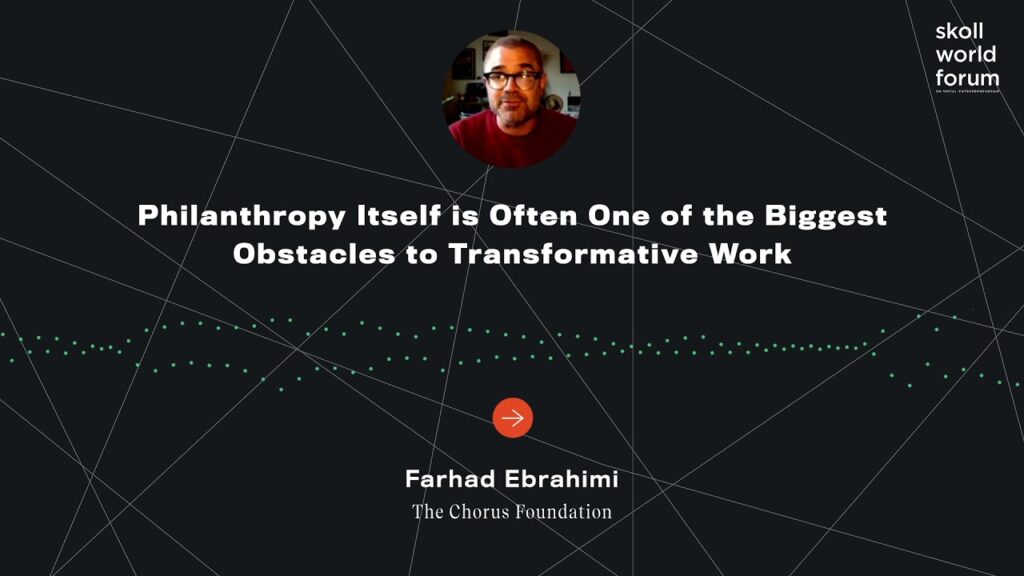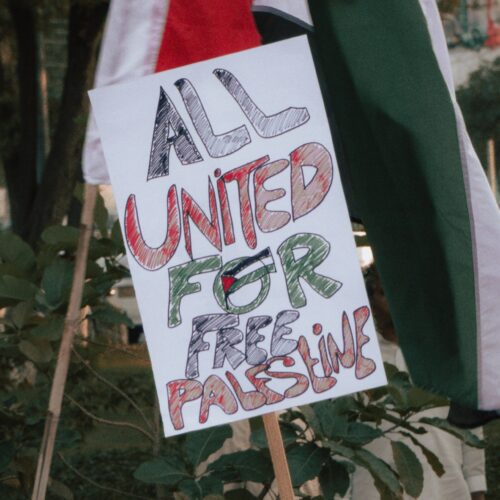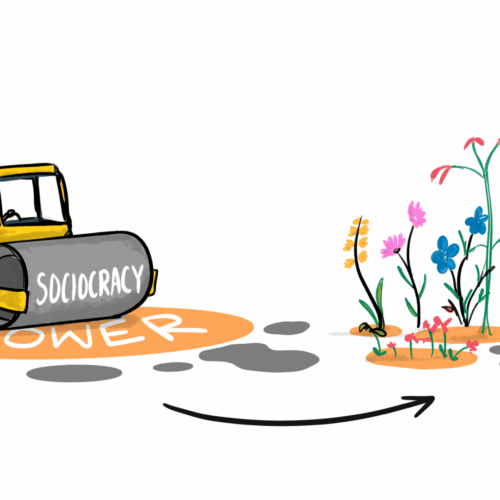Farhad Ebrahimi | Founder and President, Chorus Foundation
First published on the Good Move Initiatives blog

Tell us a little bit more about the Chorus Foundation’s mission. You were raised in a wealthy Iranian American family. How has your family background affected you in this entrepreneurial journey and when did you decide to become involved in this field?
This story begins with a successful tech entrepreneur, but that successful entrepreneur was definitely not me. It was my father, who struck gold in the desktop publishing industry in the late 1980s. And so my entire introduction to the world of philanthropy was as a younger member of a wealthy family. It’s worth noting that I’m the radical lefty in my family, but I’m also very much of my family in the sense that both of my parents are refugees – my father is Iranian and my mother was born in Cuba – and that this has had a significant impact on me. To say that my family talked politics at home while I was growing up would be an understatement. My parents have always described their refugee experiences not only as displacement, or as the loss of home, but also as clear examples of what can happen when US foreign policy undermines community self-determination in other parts of the world. These conversations set me down a particular line of inquiry, ultimately leading me to the political orientation I hold today.
At the same time, there was this family money thing happening in the background. The Iranian Revolution had left my family’s finances in shambles. But, by the time I was in high school, it was clear that we’d become wealthier than ever. My father had put his ownership shares of that same desktop publishing business in both my and my sister’s names, and the wealth under my direct control was now worth millions of dollars. This made me extremely uncomfortable! And I initially did everything I could to avoid the subject. After a lot of soul searching, however – and after quite a few conversations with working class friends whose wisdom I sought out – I committed to redistributing all of the wealth under my direct control. The money had never felt like it was mine, and I’d since been educated as to all the ways in which the accumulation of such wealth – even in well-intentioned families such as my own – could only happen at the expense of keeping other people poor. So I never really managed or invested the money myself, I just started giving it away.
16 years ago, I started the Chorus Foundation as the primary vehicle for redistributing my own wealth. At first, I had trouble reconciling my own lefty politics with the project of philanthropy, and so Chorus’ initial approach was admittedly somewhat conventional. I was a living donor, and I was bombarded by the kind of advice that living donors are given: pick an issue, identify a measurable outcome, develop my own strategy to move the needle, and then treat potential grantees like service providers to implement that strategy.
I picked climate change – not because it was the only thing that I cared about, but because I’d been told that effective philanthropy could only work at one thing at a time. However, the so-called “focused” strategies we saw in mainstream climate philanthropy only produced mixed results at best. I’d be lying if I claimed that Chorus didn’t make any mistakes of our own, but ultimately we chose a different path. It wasn’t too hard to find the other cynics in philanthropy, and they encouraged us to connect directly with leaders in the grassroots organizing sector – as did the friends and mentors I had wholly outside the world of philanthropy and finance. As somebody who’d been raised to value the concept of community self-determination, these recommendations resonated deeply! And, unsurprisingly, we found ourselves learning a great deal more from frontline, working class leaders of color than we ever did from our predominantly white, privileged peers in climate philanthropy.
One of the biggest things we learned was that the central challenge of the climate crisis wasn’t around policy, technology, or science; it was – and still is! – in generating the political will necessary to implement real solutions – not just for climate, but for so many other issues as well. With that in mind, we shifted away from our old issue focus on climate and toward a new, overall framework of building and shifting power. This means that we fund multi-issue organizations that are building and shifting political, economic, and cultural power in communities that have historically had power wielded against them – Black folks, Indigenous Peoples, immigrants and refugees of color, and working class people more broadly. And we don’t just fund them to work on climate, having instead embraced “Just Transition” as a much larger frame for systemic change – including but not limited to climate and climate justice. Systems change all the time, but rarely in ways that are equitable or just. The work of our grantees is to intervene in these constantly changing systems to ensure that questions of equity and power are always at the center of the conversation.
Like the Guerrilla Foundation, you are strong believers that philanthropy must break with its current operational model. In what ways can the philanthropic community change and how can wealth exist without being extracted and consolidated? Who will benefit from this new and more values-driven system?
I don’t have a commitment to the idea of wealth. What I have a commitment to is the idea that people can have meaningful, rewarding lives. “Wealth” can mean different things to different people. In terms of consolidated financial wealth, I have no commitment to it continuing to exist – quite to the contrary! Similarly, to me, “entrepreneur” is a word that has strong individualistic, capitalist connotations that I find problematic, and I certainly don’t consider myself an entrepreneur in that sense. I think of myself more as an organizer who is always looking for ways to support the leadership of others.
Power isn’t just the frame for what we fund; it’s also the frame for how we fund it. Funders – and particularly high net wealth donors – have immense power, but we aren’t known for holding that power particularly well. In fact, philanthropy itself – the ways that we give – can be one of the biggest obstacles to transformative work. It’s possible to fund the right things in the wrong way.
So, what does it look like to do things differently? I think of it as a spectrum: from holding power accountably, to sharing power equitably, and ultimately to handing over power entirely.
One example of what I mean by “holding power accountably” is what is now called “trust-based philanthropy” – making long term, unrestricted commitments; building open, honest, and vulnerable relationships with grantees and community members; and so on. But holding power accountably is not the ultimate goal, but rather a way of cultivating the relationships necessary for a successful line of inquiry into sharing power equitably
By “sharing power equitably,” I mean the co-design of tactics, strategies, and processes with grantees and community leaders; and the building of processes and structures for democratized decision-making within a grant making program or a philanthropic institution. Again, sharing power is not the end point, but a way of exercising our collective muscles for the ultimate goal of handing power over entirely.
For Chorus, “handing power over entirely” means that we are spending down our entire endowment, – all the wealth that was originally put under my direct control. While doing so, we’re making equity grants for things like land acquisition, seeding non-extractive, cooperative loan funds, contributing to organization endowments, etc. And, most importantly, we’re supporting the creation of alternative infrastructure for resource allocation and investment that’s held by the community and will ultimately outlive the foundation itself.
As a private family foundation, I see Chorus as a transitional form. If we seek to support transformational work, then we must be open to transformation ourselves. We think of this as a “Just Transition” for the philanthropic sector And to do this, we must directly challenge the conditions that produce the wealth inequality that allows for private philanthropy in the first place.
In many ways, I think of myself as an abolitionist. Folks may be familiar with this term in the context of police or prisons. For many of us, it’s no longer a question of “good” policing vs. “bad” policing; the question has become: why is some form of policing our default solution in the first place? I think of private philanthropy in a similar way. Debates on good vs. bad philanthropy can be productive, but I’m most interested in helping to build a world in which the resources and the power aren’t extracted and consolidated in the first place.
If another world is possible, then what would equitable resource allocation look like in that world? In my mind, it would not look like private philanthropy anymore. Instead, we imagine an ecosystem of approaches to resource allocation that are radically democratic, equitable, and created by and for the same people that they are intended to benefit.
Can you tap into the so-called “regenerative economy” model? What makes you think it’s a more fitting model than the current one? Which challenges do we face if we wish to transition towards this model?
The biggest challenges are in the transition itself, which is what the concept of Just Transition is all about. We are big fans of the Movement Generation Justice & Ecology Project, and their Strategic Framework for Just Transition has deeply informed our thinking in this area.
Our current economy has an extractive relationship to resources. The relationship to labor in our current economy is that of exploitation. Our current model of governance is based on threats, violence, and militarism if you don’t conform. Our worldview is colonial and consumerist. And the outcome of all of this is the consolidation of wealth and power. This would be different in a regenerative economy: a regenerative relationship to resources and a cooperative relationship to labor, a model of governance based in radical democracy, a worldview based on interconnection and caring. And the outcome would be about well-being at every level.
Visualizing what would be different is just the first step. What does it look like to build and shift power toward this kind of economic transition? How do we make that transition in a way that is both equitable and just, with an orientation towards radical democracy, rather than simply allowing the same people to benefit who have benefited from every other economic transition? These are our biggest questions.
Your commitment to each community you are supporting is, at minimum, 500,000 dollars per year in grants. What are your sources of funding?
To be clear: it’s family money. We do a great deal of organizing in the philanthropic sector and in impact investing spaces, but we’re never fundraising for our own work. This is one of the reasons why the concept of “entrepreneur” doesn’t really resonate with me; I’m trying to organize myself out of having the power to decide where the money goes. Once Chorus is done spending down, I’m not going to start fundraising even more money just so that we can keep our doors open. Instead, I’ll be putting my efforts into mobilizing more resources into the structures for democratic resource allocation and cooperative investment that have been created by our grantees and other movement formations.
Maybe you represent a new generation of reality creators. Is this common in the US?
There’s a small but growing community of folks who are approaching philanthropy and impact investing in radically different ways. For example, Resource Generation is an organization that organizes young people with wealth and class privilege to work toward a more just and equitable world. And there are other donor communities such as Solidaire (where I was a Co-Founder), which organizes donors of all ages, and has its own resource mobilization campaigns. And there are a number of transformative organizations within institutional philanthropy as well, such as Justice Funders, which has done fantastic work in applying a Just Transition lens to philanthropy itself.
But is it common? Absolutely not. We have a lot of organizing work ahead of us.
Do you think there needs to be some education on the topic of wealth management and distribution?
First things first, when I hear the phrase like “wealth management,” I think of a culture that not only says that it’s okay to benefit from the extraction and consolidation of wealth, but that it’s important to continue hoarding – even growing – that wealth. So the only form of education I’m really interested around “wealth management” is one that challenges the very concept to begin with.
When it comes to wealth redistribution, one of the challenges is that, while political education is absolutely necessary, it’s also totally insufficient by itself. In my experience, there are a number of political education offerings out there, but those who are able to participate often go back to their families, or to their institutional workplaces, and then nothing changes. Where’s the disconnect? Were they not really interested in the first place? Or are they having trouble moving these new ideas forward with family members, or bosses, or boards who are skeptical, maybe even resistant? This is why the concept of “funder organizing” is so important to me; folks need something deeper beyond political education, they need leadership development, skills building, coaching, and ongoing organizing infrastructure to support them as organizers within those families, or those workplaces.
For example: if you have a younger, more left-leaning member of a wealthy family, and if you help them dream of what an alternative system could look like, then they still have to go back to their family, which has not necessarily been exposed to anything like that. Their family may be at risk of rejecting some of these new ideas, and so they’ll have to find ways to move an organizing agenda through their family over time. Political education is important to get people started, but ultimately it comes down to one’s ability to organize other people. And there are concrete sets of skills required to enter a space with other people, where ideas are contested, and move a transformative agenda through that space.
How can individuals connect with you?
Always happy to have folks reach out to me via email at farhad@chorusfoundation.org, with the caveat that Chorus is in our final 15 months! The people I most look forward to connecting with are members of wealthy families or professional staff at foundations who are trying to move a progressive or radical agenda through that family or that institution. I would love to connect to see if there are ways that I can be helpful!
Is there anything else you’d like to add?
For me, the seed of this work comes from approaching these questions with radical humility. For example, my belief in abolition comes from openness to the idea that we can do things differently. Let’s open ourselves up to just how different things – including ourselves – can be!




